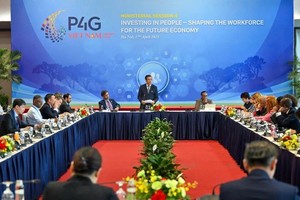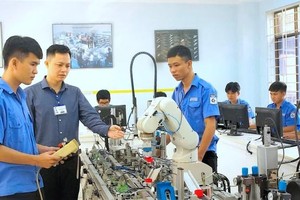
The Vietnam General Confederation of Labor reports that there are 431 industrial parks in the country, employing over 4.16 million direct workers, with females constituting 60 percent to 70 percent of this workforce. Despite this significant number, the availability of kindergartens and nurseries within these industrial parks remains severely inadequate.
In Ho Chi Minh City, for instance, public facilities only fulfill 15 percent of the childcare needs of workers. As a result, many female employees are compelled to rely on costly private childcare services or family members for assistance, which creates various economic and psychological challenges.
Dong Nai Province is home to over 33 industrial parks, yet only six kindergartens have been established, primarily through the efforts of individual enterprises. This stark shortage severely limits childcare options for workers. Similarly, VSIP Industrial Park in the Northern city of Hai Phong employs 30,000 workers, so the demand for childcare, especially for children under 36 months, is overwhelming. While a few enterprises have established their own childcare facilities, the majority of workers rely on private providers.
Many families of workers are compelled to send their children to live with grandparents in rural areas because of insufficient childcare options. This situation creates emotional gaps and complicates family dynamics. At the same time, numerous private childcare facilities fail to provide adequate educational quality and safety for children.
Furthermore, the operating hours of public childcare services do not align with the extended hours and overtime demands of working parents. As a result, female employees face significant stress in managing childcare responsibilities, which adversely impacts their work performance.
Although some enterprises have tried to invest in building daycare facilities right on the premises, the number is still very limited due to land fund and mechanism problems.
A trade union representative highlighted that older industrial parks largely lack planning for kindergartens and schools. Vice President of the Hai Phong City Labor Federation, Nguyen Thi Thu Thuy, emphasized that securing land within industrial parks is the most significant hurdle. Without government support, constructing kindergartens becomes an insurmountable challenge.
The Government’s Decree 115/2020/ND-CP stipulates that new industrial parks must reserve land for education facilities including kindergartens. However, implementation is still not uniform. New industrial parks often prioritize the development of production infrastructure over works serving the lives of workers.
The Vietnam General Confederation of Labor is currently developing ‘Project to Support Workers in Industrial Parks and Export Processing Zones in Child Care and Raising’. This initiative aims not only to increase the number of kindergartens but also to provide support to private facilities that meet the necessary standards, ensuring that the childcare needs of workers are adequately addressed.
At workshop about the draft project held in Hanoi and Ho Chi Minh City, representatives from many localities proposed that there should be land funds for kindergartens in industrial parks and export processing zones.
Vice President Tran Thi Nguyet of the Trade Union of the Southeast Economic Zone in Nghe An Province proposed that the State should require land funds to build kindergartens in new industrial park projects, similar to the social housing model.
To effectively address the aforementioned issue, it is essential to establish coordinated efforts among all stakeholders, including local authorities, businesses, and trade union organizations. Initially, new industrial parks should allocate land resources for educational institutions.
Last but not least, it is important to motivate companies to invest in the construction of kindergartens by offering tax incentives and financial assistance. Concurrently, trade unions must enhance their monitoring efforts and promote successful models, while also advocating for policies that prioritize the children of workers.
The resolution of the shortage of kindergartens and preschools will create a more conducive environment for workers to concentrate on their professional endeavors and improve their overall well-being. This constitutes not only an enhancement of worker welfare but also a crucial factor in driving sustainable social development.
























